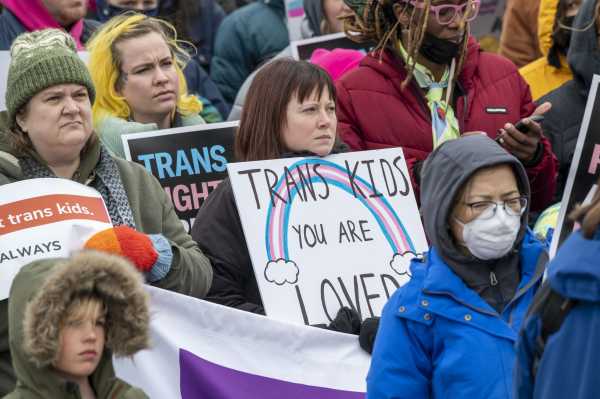
Republican-controlled state legislatures across the country are taking up anti-trans and anti-abortion bills at a shocking rate, as lawmakers seize on an enforcement mechanism first tested by Texas’s SB 8.
Multiple states — including Florida, Idaho, and Texas — have enacted, or hope to enact, new and draconian restrictions, including banning abortion after six weeks of pregnancy (functionally equivalent to an outright ban on abortion), or banning gender-affirming health care for transgender children.
Such legislation is part of an existing trend — just last year, the US passed at least 106 abortion restrictions, making it the single worst year for reproductive health care access in the country’s history — but one that’s growing. In states like Missouri, lawmakers are pushing the envelope with legislation intended to expand abortion restrictions even outside of the state.
Legislation regarding transgender youth, in particular, has also increased. In April 2021, Republican lawmakers in Arkansas passed Act 626, becoming the first state to outlaw gender-affirming treatment for trans youth (the bill is currently being blocked by a federal court order). Other states have since followed suit: A month later, Tennessee lawmakers passed a slew of anti-trans bills, including the state’s own ban on gender-affirming treatment for trans minors. And this year, Alabama is pushing one of the most extreme anti-trans health care laws to date with legislation that would jail doctors who provide health care treatment or perform gender-affirming procedures to trans minors.
“There has been an explosion of these bills,” Cathryn Oakley, who tracks legislation for the Human Rights Campaign, an LGBTQ advocacy group, told Mother Jones. She said that out of more than 130 anti-trans bills introduced in the country this year, at least 38 would deny trans children access to gender-affirming health care.
Part of the explanation could lie in an increasingly conservative Supreme Court. Though the constitutionality of many new state-level restrictions may be questionable at best, the 6-3 conservative bench may prove more receptive to Republican arguments.
There’s also an overtly political component, however. Out of power on a federal level and hoping to reclaim control of Congress in the 2022 midterm elections, Republicans have signaled that they view legislation targeting trans children as good politics for them.
Those factors mean that such bills are continuing to gain ground in Republican-controlled states, and continuing to grow in scope — despite the harm they may pose to people who can get pregnant and to trans people.
Anti-abortion and anti-trans laws are getting more extreme
The success of Texas’s SB 8 has introduced an entirely new wave of anti-abortion legislative tactics in the US, which in some cases has also been extended to anti-trans measures.
SB 8, which was signed into law by Texas Gov. Greg Abbott last year, not only bans abortion after six weeks of pregnancy but also deputizes citizens to enforce it, allowing any person to bring a civil lawsuit against an entity who “aid or abets” in an abortion procedure for damages of at least $10,000. The law is facing multiple legal challenges, but it’s currently in effect and appears likely to stay that way.
Since then, Republicans in other states are using a similar enforcement mechanism to underpin even more draconian measures. Idaho lawmakers, copying Texas’s abortion ban, are pushing a bill that not only bans abortion after six weeks of pregnancy but uses a similar bounty-style component that would allow family members of rapists to sue medical providers who perform an abortion on the rapist’s victim. Lawmakers in Missouri have also followed the Texas model for a proposed anti-abortion bill, adding a dangerous provision that would force pregnant individuals to carry ectopic pregnancies to full term, which health professionals have made clear are 100 percent fatal if left untreated.
The argument for these anti-abortion laws hinges on the belief that a fetus should be considered a functioning human because its heartbeat can be heard on ultrasound (Texas’s SB 8 bill is also referred to as “the heartbeat law” by its proponents). But this claim has been repeatedly debunked by medical professionals, who explain the term “fetal heartbeat” is misleading. Any activity captured in an early gestation ultrasound is “actually electrical activity, and the sound that you ‘hear’ is actually manufactured by the ultrasound machine,” not a human heartbeat.

With the upcoming Supreme Court decision on Dobbs v. Jackson Women’s Health Organization, expected to be handed down by June or July, the right to an abortion could be eliminated entirely at the federal level — likely only increasing the proliferation of harsh state-level restrictions.
The accelerating extremism behind Republican anti-abortion laws is equally on display when it comes to legislation targeting trans people, and particularly trans children.
There are literally hundreds of anti-trans bills currently in the works across at a state level, but a handful of these laws have grabbed national attention due to their severity.
Among the most extreme is Alabama’s anti-trans bill, which has two notable components. First, it criminalizes doctors who provide hormone treatments and other gender-affirming care to trans teens, an offense punishable by up to 10 years in prison. Second, the bill requires teachers and staff to out transgender students whose trans identities are not already known to their parents. The bill has already passed the Alabama Senate and is expected to be approved by the House.
In Texas, parents of trans children are in danger of being investigated for “child abuse” following an order by Abbott, which criminalizes parents who allow their kids to receive gender-affirming treatment. The policy is currently on hold after a district court injunction, but it represents yet another new tactic for anti-trans lawmakers.
Specifically, Texas’s anti-trans policy is unusual since it was not passed through state legislation but enacted based on a non-binding opinion from Attorney General Ken Paxton, as a way to circumvent the governor’s lack of authority to put out such an order.
Republicans pushing new anti-trans measures often claim parents and health care professionals are “pressuring” young children into undergoing gender-affirming surgery which they argue could cause irreparable harm to the child, like infertility.
Advocates and doctors, however, say the reality is different. Research shows providing accessible gender-affirming health care to trans youth have an overall positive effect on young people, reducing the likelihood of depression and suicide among transgender youth.
And Texas’s new policy is poised to cause very real harm to trans children. Claudio, the parent of a trans teen in Texas, told Vox’s Nicole Narea pseudonymously that prior to coming out, “my child was suicidal. My child was hospitalized in a mental hospital because of suicidal ideation. And the moment they told us that they were transgender was the moment that they started getting better. A lot of the time, you don’t get to choose. Your kids are who they are.”
The endgame to these laws may be political for Republicans
Strict abortion restrictions in the US are part of a decades-old ideological project by the right, and anti-trans laws are nothing new either. In addition to a conservative Supreme Court majority apparently friendly to such restrictions, though, political expediency is giving the current surge of lawmaking additional traction.
As Katelyn Burns, a MSNBC columnist who has previously written for Vox, explained to Slate this month, “we are seeing institutional pushback against this order because I think a lot of people see this what it really is: posturing for a primary campaign that Abbott is facing against a much more conservative candidate.” (Abbott won his primary by a comfortable margin this month.)
Abbott strategist Dave Carney also admitted as much to reporters earlier this month, describing Texas’s policy of investigating the parents of trans children for “child abuse” as a “a 75-80% winner,” according to a tweet by Texas Tribune reporter Patrick Svitek.
“That is a winning issue,” Carney reportedly said. “Texans have common sense. This is why the Democrats across the country are out of touch.”
Similar considerations may also be playing into legislation in other states. South Dakota Gov. Kristi Noem and Florida Gov. Ron DeSantis are both widely thought to have future presidential aspirations — particularly if the 2024 Republican field doesn’t include former President Donald Trump — and their states have advanced harsh new legislation this year.
In Florida, DeSantis is expected to sign a ban on all abortions after 15 weeks, which recently passed the state legislature. South Dakota lawmakers have also advanced a Noem-backed bill sharply limiting access to abortion pills in the state (though it’s currently tied up in court), and Noem last month signed a bill banning transgender girls from participating in high school and college sports that align with their gender identity.
The political weight behind such measures is relatively new: As recently as 1984, data suggests, a person’s political affiliation was not closely tied to their position on abortion. But by 2020, the gap between pro-choice Democrats and anti-abortion Republicans had widened tremendously, reaching a 59 point-difference among “strong partisans, the group most likely to vote in primary elections.”
There is also evidence that racial attitudes have become closely intertwined with a person’s position on issues like welfare, gun control, immigration, and even abortion, which may explain why recent laws resonate with GOP base voters. Such identity politics, Republicans hope, could be a winning strategy to take back power in 2022.
It’s unclear, however, whether that will translate to general election contests, despite Carney’s claim. Such policies may play well with Republican primary electorates — as Abbott apparently calculated ahead of his gubernatorial primary earlier this month — but polling suggests Texas-style attempts to limit access to gender-affirming health care are sharply unpopular overall.
In one poll conducted last month by Data for Progress, 63 percent of all voters — and even 46 percent of Republicans — said they supported leaving decisions about health care “to children who identify as transgender, their parents, and their doctor” rather than the state.
Support for the right to an abortion is also high — according to a CNN-SSRS poll from January, 69 percent of Americans oppose overturning Roe v. Wade.
So far, those numbers don’t appear to be impacting Republican fervor for new anti-trans and anti-abortion restrictions — but it raises the possibility that increasingly extreme Republican lawmakers could face a backlash rather than a political boost.
In the meantime, though, such measures are causing real harm. “It I don’t know how much risk we’re going to be willing to take, so at some point, we might decide to cut our losses and pick up and leave,” Claudio, the Texas parent of a trans teen, told Vox. “Persecution scares you extra.”
Will you support Vox’s explanatory journalism?
Millions turn to Vox to understand what’s happening in the news. Our mission has never been more vital than it is in this moment: to empower through understanding. Financial contributions from our readers are a critical part of supporting our resource-intensive work and help us keep our journalism free for all. Please consider making a contribution to Vox today.
Sourse: vox.com






